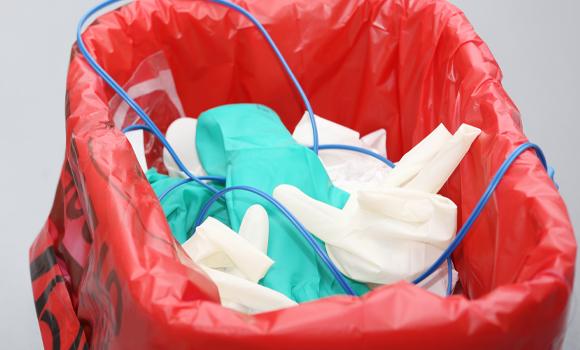Know-how Released: Understanding the Art of Medical Waste Removal for Health And Wellness Facilities
Know-how Released: Understanding the Art of Medical Waste Removal for Health And Wellness Facilities
Blog Article
Exploring Different Waste Disposal Options for a Cleaner Environment
In the quest of a cleaner environment, the management of waste disposal has emerged as a vital focal point for lasting advancement. With a plethora of waste disposal choices available, varying from standard landfill approaches to cutting-edge waste-to-energy technologies, the selection of exactly how we manage our waste has significant implications for our world's well-being.
Recycling Approaches
Executing reliable reusing methods is crucial in minimizing waste and promoting sustainability in our environment. Recycling entails the process of transforming waste materials right into reusable challenge avoid unneeded disposal. Among the most usual recycling methods is material recuperation, where materials like paper, plastic, glass, and metal are accumulated, sorted, and processed to produce brand-new products. This procedure not only saves natural deposits however likewise reduces energy usage and greenhouse gas exhausts connected with generating new materials from square one.
Another essential recycling approach is composting, which involves decomposing organic waste like food scraps and lawn trimmings into nutrient-rich soil. This procedure not only diverts organic waste from landfills however also creates a beneficial source for horticulture and farming. Additionally, upcycling is an innovative recycling technique that includes transforming old or disposed of products into products of greater top quality or worth. By incorporating these various recycling methods right into our waste management methods, we can dramatically lower our ecological impact and move towards a more lasting future.

Composting Techniques
Effective waste monitoring practices, such as reusing techniques, pave the method for a cleaner environment, and now, shifting the emphasis to 'Composting Techniques', we check out lasting ways to disintegrate organic waste for environmental benefit. medical waste removal service.
Composting is an all-natural procedure that changes organic waste, like food scraps and yard trimmings, right into a nutrient-rich dirt amendment. The key to effective composting depends on developing the best equilibrium of green materials, such as vegetables and fruit scraps, and brownish products, like dried out leaves and branches. These materials disintegrate with the aid of microbes, damaging down the waste right into beneficial garden compost.
Conventional backyard composting involves layering natural products in a bin or stack and regularly turning the blend to aerate it. By using composting strategies, we can decrease the amount of waste sent to garbage dumps while creating a valuable product for enhancing dirt and supporting plant development.
Incineration Cons and pros
Incineration, as a waste disposal technique, presents both advantages and drawbacks that merit careful factor to consider in the realm of sustainable waste management practices. On the favorable side, incineration can significantly reduce the quantity of waste, minimizing the need for garbage dump space and possibly reducing greenhouse gas discharges.
In addition, the high first financial investment and operational expenses of incineration centers posture economic obstacles, making it a less affordable alternative contrasted to various other waste administration approaches. Cautious monitoring and law are necessary to reduce these negative influences and make best use of the benefits of incineration as part of a comprehensive waste administration approach.
Landfill Administration Techniques
Landfills play an essential function in waste monitoring and environmental conservation by supplying a control system for the disposal of strong waste products. By condensing the waste, the quantity is decreased, allowing for even more waste to be suited over time.
Additionally, the execution of day-to-day cover methods is important in lessening smells, protecting against litter, and reducing the tourist attraction of bugs. Covering the disposed waste at the end of every day helps to consist of smells and avoid potential environmental contamination. Furthermore, the surveillance of garbage dump gas discharges and leachate levels is crucial in ensuring that environmental criteria are satisfied which any type of possible risks to bordering ecological communities are minimized.

Waste-to-Energy Technologies
Among the innovative approaches to squander administration includes taking advantage of Waste-to-Energy technologies to convert solid waste into usable energy resources. Waste-to-Energy (WtE) technologies incorporate a variety of processes that aim to draw out energy from waste materials via thermal, chemical, or organic ways. This conversion procedure not only reduces the volume of waste that ends up in land fills yet additionally generates useful power sources such as electrical power, heat, or biofuels.
There are several approaches of Waste-to-Energy conversion, consisting of pyrolysis, incineration, and gasification. Incineration entails melting waste at heats to produce warmth and electrical energy. Gasification transforms waste right into a syngas, which can be utilized for power generation or chemical production. Pyrolysis breaks down natural materials using high temperature levels in the lack of oxygen, creating gas, char, and bio-oil.
Applying Waste-to-Energy innovations can help alleviate ecological problems connected with typical waste disposal approaches while concurrently offering an eco-friendly power source. Nevertheless, mindful consideration has to be offered to emissions control and making certain the sustainability of feedstock supplies for these modern technologies to be truly valuable for a cleaner atmosphere.

Verdict
To conclude, exploring numerous garbage disposal alternatives such as reusing, composting, incineration, land fill management, and waste-to-energy technologies is vital for advertising a cleaner setting - click here. Each method has its own benefits and obstacles, but by using a mix of these approaches, we can work towards decreasing the amount of waste that winds up in landfills and ultimately add to a much more sustainable future for generations to find
With a plethora of waste disposal alternatives available, varying from typical land fill approaches to cutting-edge waste-to-energy modern technologies, the choice of how we handle our waste has far-reaching implications for our planet's well-being. medical waste removal.Incineration, as a waste disposal method, presents both advantages and negative aspects that warrant mindful factor to consider in the realm of lasting waste administration methods.Garbage dumps play a critical duty in waste administration and environmental preservation by giving a control system for the disposal of solid YOURURL.com waste materials. By compacting the waste, the quantity is minimized, permitting for even more waste to be suited over time
One of the cutting-edge strategies to lose administration involves harnessing Waste-to-Energy technologies to convert solid waste right into functional energy sources.
Report this page